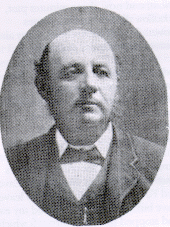

Augustus William Harvey was born in Bermuda on May 31, 1839. Harvey's ancestors were among the first settlers in Bermuda in the early 17th century and by the early 19th century his family was active in trade between Bermuda and Newfoundland. Harvey received his early education in Canada and then studied at the University of Pennsylvania. He came to Newfoundland in 1853, first working briefly for the Marine Insurance Company before joining the fishery supply firm of Dunscombe, Harvey and Company, that was partly owned by his uncle, Eugenius Harvey. There were several changes in partnerships and titles of the company which after 1866 was known as Harvey and Company. In 1861 Augustus Harvey joined the firm and became its managing partner with the departure of his uncle to Bermuda.
Unlike most Newfoundland mercantile houses whose trading was based with England and Scotand, Harvey and Company was North American in origins and its interests included a substantial import trade with the United States and Bermuda and it had a branch in New York. The firm was one of the first to become actively involved in importing foodstuffs from the United States. Its flour and provision trade by the early l900s would be the largest in the Island. The company was also active in the fish export business and by the 1880s would be the eighth largest exporter in Newfoundland, shipping cod to the Caribbean and South America. In the mid-1880s Harvey and Company became a minority partner in the New York, Newfoundland and Halifax Steamship Company (known as the Red Cross Line), which provided a weekly service from St. John's to Halifax and New York.
Harvey was one of the pioneers in establishing local industries in Newfoundland and his company was a prime beneficiary of the government's efforts from the 1870s to promote local industries through tariff protection. Among the many businesses he established at St. John's in the early 1870s were furniture, tobacco, margarine, biscuit, and bread factories.
Having supported the anti-confederate party in the 1869 general election, on February 14, 1870, Harvey had been appointed to the Legislative Council by Premier Charles Fox Bennett. Harvey remained an anti-confederate for the remainder of his life. In the 1870s and early 1880s Harvey was a strong supporter of the efforts of Conservative premiers Frederick Carter and William Whiteway to secure foreign investors for a railway across Newfoundland. In this regard, he differed from his fellow Water Street merchants, who generally opposed its construction.
Although Harvey favoured railway building, he otherwise shared the outlook of his fellow merchants in his concern for the fisheries. In 1886 he helped the government of Premier Robert Thorburn to draft legislation regulating the sale of bait fish to French fishermen on the Grand Banks. Approved by the British government the following year and put in force in 1888, the Bait Act symbolized the fears of Water Street merchants, who blamed a subsidized French fishery for the increased competition from France in Newfoundland's traditionally strong markets in southern Europe. Harvey also advocated innovation in the fisheries and pressed for the colony to follow the lead of other countries and establish a bureau to conduct scientific investigation. In 1889 Harvey became chairman of the fisheries commission established by the Thorburn Government in that year. He strongly supported the work of the commission's superintendent, Norwegian fisheries official Adolph Nielsen. When, in the 1890s the government withdrew financial support for a cod hatchery at Dildo, Harvey funded it for a year.
In the 1889 general election Harvey prudently gave financial support to both sides. Whiteway's supporters were successful and Harvey entered the cabinet with responsibility for the fisheries commission while continuing as its chairman. Harvey wielded considerable influence within the government. Although he supported Whiteway's policy of railway development to open up the interior of the island, on the bait and French Shore questions his views resembled those of Water Street merchants who had supported Thorburn. Harvey intimated to his close associates that he joined the Whiteway government to protect the existence of the newly established fisheries commission and enforcement of the Bait Act.
In 1890 he supported Whiteway's decision to complete the railway across the island as a means of strengthening Newfoundland's economy and hence postpone any new efforts by local politicians for confederation with Canada. When Colonial Secretary Robert Bond negotiated a proposed reciprocity treaty in 1890, Harvey endorsed it fully as it would strengthen Newfoundland's trading ties to the United States. Canadian opposition to this deal, which excluded Canada which itself was unable to strike a similar free trade deal with the United States, led to the Colonial office refusing to sanction the so called Bond-Blaine Convention.
Harvey remained an important player in the Newfoundland economy. In 1896 his company revived the whaling industry through the establishment of the Cabot Steam Whaling Company, which used the technical expertise of Adolph Nielsen and other Norwegians. Harvey and Company pioneered pulp and paper making and in 1897 built Newfoundland's first pulpmill at Black River in Placentia Bay. It operated for only a few years before closing because of insufficient water-power.
Well-known for his philanthropy, Harvey was instrumental in establishing the Fishermen's and Seamen's Home, opened in December 1886. He served on a committee set up in 1893 to help English doctor Wilfred Grenfell provide medical care to residents of coastal Labrador. Further, Harvey was prominent in lay and educational matters of the Church of England. He died at St. John's on February 7, 1903. He had had, as the St. John's Trade Review observed in 1903, "buoyant enthusiasm and belief in the country's undeveloped capabilities" through economic diversification.